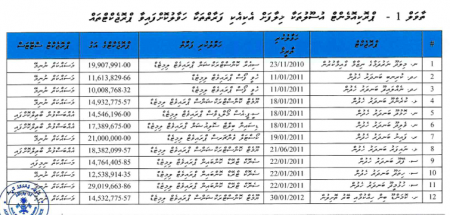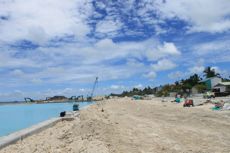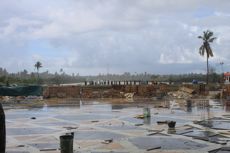The record MVR24.3 billion (US$1.5 billion) state budget for 2015 submitted for parliamentary approval last week is a balanced budget, President Abdulla Yameen insisted yesterday in his Republic Day speech.
Referring to the Progressive Party of Maldives’ (PPM) campaign pledge to balance the budget in two to three years, President Yameen said the 2015 budget has a “primary balance surplus.”
“Looking at the figures of the budget, that is not a deficit we cannot plug. The deficit is a small figure,” he said.
The projected fiscal deficit in 2015 is MVR1.3 billion (US$84 million) or 2.5 percent of GDP.
The deficit was not for the state’s expenditure in 2015, Yameen continued, but for arrears or unpaid bills from recent years.
“So in my book, the 2015 budget is a balanced budget,” he said.
In his budget speech to parliament last week, Finance Minister Abdulla Jihad revealed that the forecast for recurrent expenditure in 2015 is MVR15.8 billion (US$1 billion) while the forecast for government income or revenue is MVR21.5 billion (US$1.3 billion).
The projected revenue includes MVR3.4 billion (US$220 million) anticipated from proposed new revenue raising measures.
A balanced budget would allow the government to “consolidate the economy,” maintain the value of the rufiyaa, and repay foreign and domestic debt, Yameen said.
After balancing the budget, Yameen said the government should work toward achieving a surplus.
The public expected waste management systems, water and sewerage, harbours, and land reclamation, he continued, noting that the MVR6.3 billion (US$408 million) Public Sector Investment Programme (PSIP) in the 2015 budget – 24 percent of the budget – was unprecedented and double that of 2014.
Yameen observed that the PSIP budget was around MVR3 billion (US$194 million) in the past.
While carrying out infrastructure projects in all 188 inhabited islands in one year would not be possible, Yameen said the budget was formulated after prioritising developmental projects.
Moreover, the government would seek foreign aid, soft loans, and concessional loan assistance to finance infrastructure projects, he added.
The budget also includes welfare or social security benefits for the needy, the elderly, and persons with special needs, he noted.
The MVR5,000 (US$324) a month allowance or old age pension would be provided in 2015 as well, Yameen said, while subsidies for food and electricity would be targeted to the needy.
Achievements
On the government’s achievements during its first year in office, Yameen said the economy was improving as a result of the government’s policies.
The acute dollar shortage of recent years has been alleviated, he added, while the ‘unlimited’ Aasandha insurance scheme was introduced to assist persons with chronic illnesses.
While there were only nine pharmacies in the atolls last year, the State Trading Organisation has opened 71 pharmacies in various islands this year.
Moreover, sea ambulance service was provided to six atolls, he continued, and a 50-bed multi-speciality hospital would be built in Hulhumalé within three years.
Efforts were underway to install generators across the country to ensure reliable round the clock electricity in all inhabited islands, he said.
The Special Economic Zone Act would meanwhile facilitate attracting foreign investment, Yameen said.
The government has also decided to provide sovereign guarantee for loans to develop new resorts, he continued, while the guest house island policy would benefit small and medium sized enterprises.
The government’s plan to create 94,000 new jobs as pledged during last year’s presidential campaign was through economic diversification or development and not through the civil service, he noted.
On the pledge to develop a ‘youth city’ in Hulhumalé, President Yameen said the second phase of the island’s development through further land reclamation would begin during November.
Work has also begun on introducing an insurance scheme and providing subsidies to fishermen and farmers, he added.
The implementation of the new national education curriculum in 2015 would meanwhile bring “revolutionary changes” to the education sector, Yameen said.


